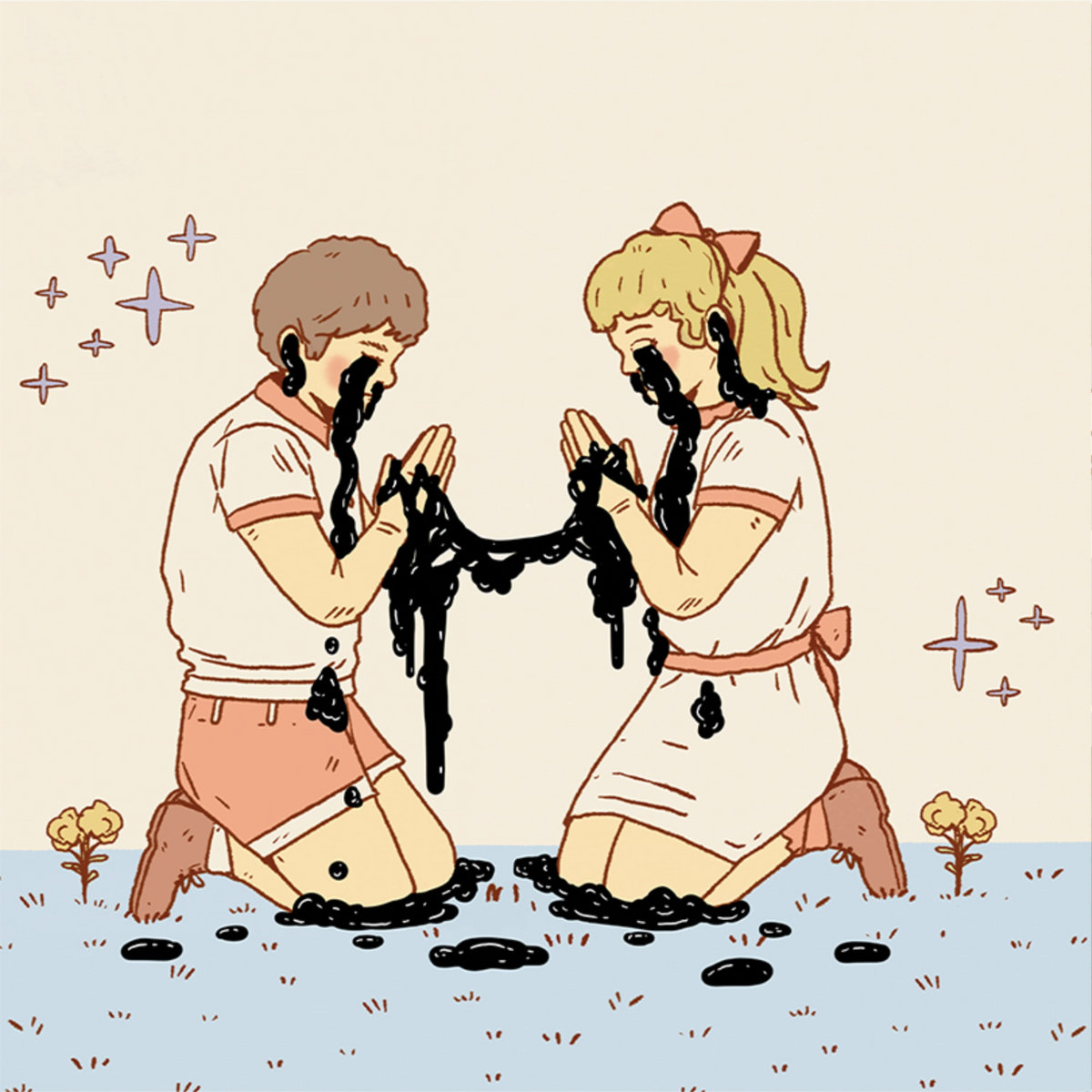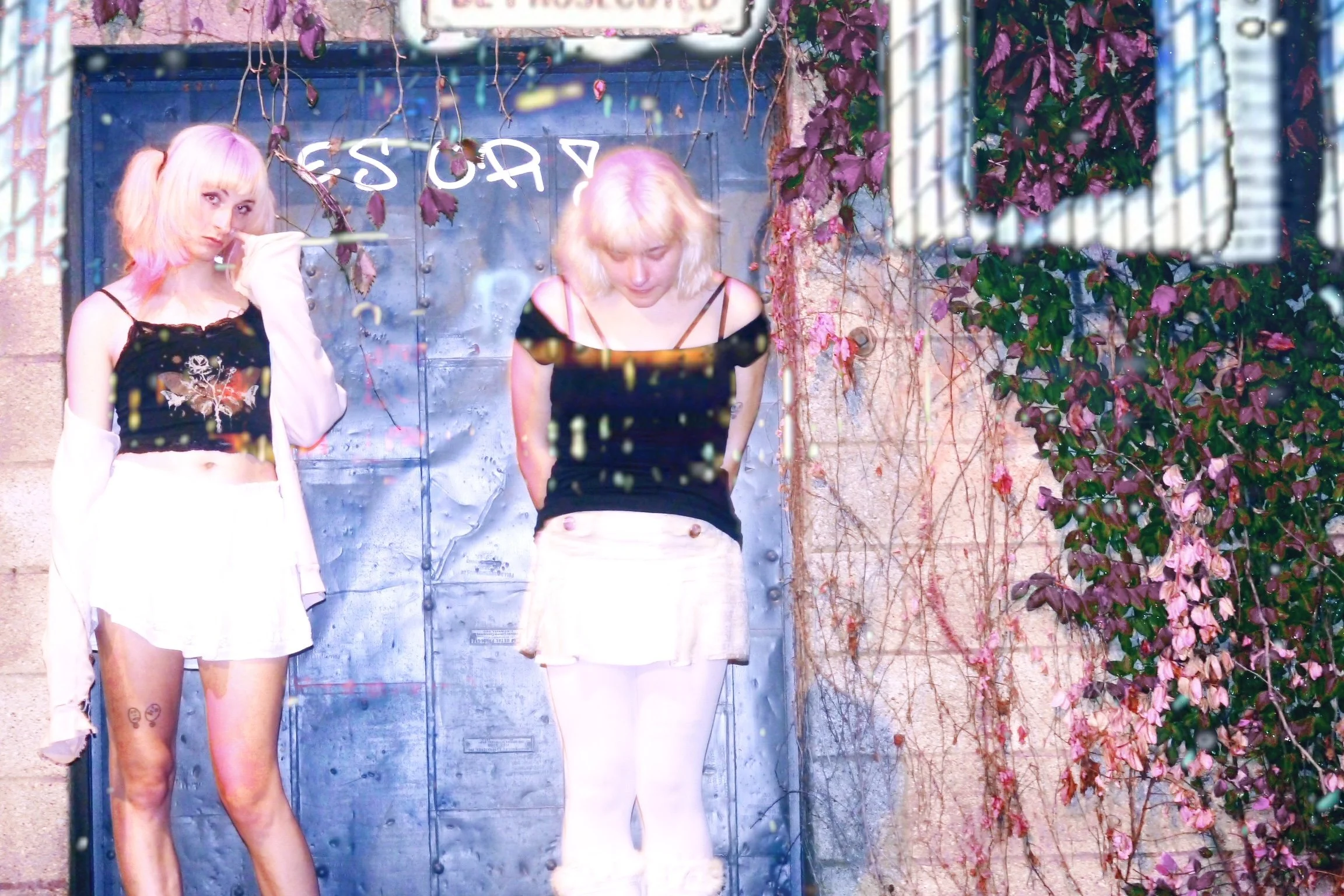Pretty Bitter – Pleaser | Album Review
/Tiny Engines
Washington D.C. is covered in monuments and artifacts — libraries dedicated to preservation, tours through important memorials, documentaries that weave the past together, and constant conversations about what D.C. used to be like. The whole city is a nostalgic town, drenched in continuous reminders of what stood there once upon a time and what histories remain. I propose it’s time for a new monument in D.C. — a dollhouse.
For Pretty Bitter’s new album, vocalist Mel Bleker and bassist Miri Tyler spent the past year decorating a dollhouse by hand. The final structure depicted on the cover is a colorful two-story home where each room looks lived in: the bed isn’t made, the refrigerator door is swung open (running up the dollhouse’s electricity bill and pissing off the doll roommates, I’m sure), and a bong sits abandoned on the living room table. The dollhouse is also full of smaller details: a real Pretty Bitter poster is pinned to the bedroom wall, a second, tinier dollhouse is tucked away in the attic, there’s a wine glass dropped on the kitchen floor, and the album’s title is scrawled on the bathroom wall: Pleaser.
Pleaser is the sophomore album from D.C.’s hometown heroes, Pretty Bitter, a band that I have had the honor of seeing countless times over the years I’ve lived in the city. If there’s one word I would use to describe them, it’s unflinching. There’s a resiliency to their music and a playful stubbornness to their attitude that I have watched them exude in every space they occupy. Their latest release triumphantly carries that confidence as a dreamy pop album that demands to be dissected – a perfect amalgamation of dance rock, synth-driven disco, bubbly ballads, and spunky emo centered around the clarion call of vocalist Mel Bleker.
“The Coroner's Song” opens the album with bleak table setting and tragic lyricism, like Bleker’s lingering “I didn’t die to prove something, I just thought that there was more.” One track later, the lead single “Thrill Eater” is where the lyric’s unexpected, and at times grotesque, imagery starts to antagonize the otherwise upbeat sound of the band. Against the pluck of a banjo and the thick strum of a bass, Bleker asks the haunting question, “What happens to a body when it’s scared?” followed by a sharp “What is your ailment, is it fixable in kind?” their voice slicing through the short syllables of “kind.” In the chorus, Bleker promises, “I can be your thrill eater / Broken bone baby / With a splinter for a spine.” This lyricism is the gravitational center of the album, an instrument of its own as Bleker’s voice cuts through the sparkly and rhythmic sounds of the band, creating a texture of its own.
“Thrill Eater” is also where the title of the album comes into play. Bleker offers to be “your thrill, your pleaser” but begs this subject to “take as much as you want / as long as it’s not mine.” Pleaser is a really charged word. There are some sexual connotations and some pathetic connotations, but I think the first inclination is to think of a missing first word — people. A People Pleaser. In Bleker’s lyricism however, the songs deal primarily in the aftermath, leaving the pleaser without people and reconciling that loss. Time forces the pleaser to move forward alone.
From there, the album shifts into the ethereal “Outer Heaven Dude Ranch,” where Bleker proclaims “Time isn’t a fighter, but it will get its way / I’m getting older every word I say” over Jason Hayes’ endlessly emphatic cymbal crashes. From there, the group keeps the energy high, moving into the similarly relentless beat of “Tommy Deluxe Goes Hollywood,” which blends D.C. post-hardcore guitar feedback with the return of former bandmate Zack Be’s banjo.
If any line has stuck with me, it’s the unimpressed way Bleker sings “If it’s a joke, I didn’t get it” on mid-album cut “Cardiac.” The performance of these consistently raw lyrics varies throughout the album, while some songs use Bleker’s kind voice to undercut the menacing lyrics; other songs, like “Cardiac” or the following “I Hope You Do,” have a very direct and conversational tone. This makes the heart-thumping declarations all the more salient, like on “I Hope You Do,” where the lyrics lay out, “They will make from our ruins a monument, a reminder to ourselves that worship does not keep any temple from falling apart.”
Evan Weiss and Simon Small produced the album, and their co-production shines through the entire project, but especially in the back half as the band’s trademark synth bubbles and bursts through the violent yet fantastical “Bodies Under The Rose Garden,” and the unsuspectingly tragic 90s alt-rock track “Letter To Tracy In Her Bed.”
While the band has rearranged a bit since the creation of this album, the lineup has solidified with Kira Campbell joining on guitar and Ekko Astral’s Liam Hughes on keyboard; their live shows remain a must-see performance. This summer, Pretty Bitter played both the inaugural Liberation Weekend and returned to Faux to obsessed crowds. When I hear songs like “Textbook,” where each part is so clear, all I can think of is the perfect harmony that the band works in live, each member in lockstep with a contagious smile.
Photo by Bailey Payne
The album ends on an extended leitmotif, “Outer Heaven,” which calls back to its twin “Outer Heaven Dude Ranch.” However, instead of using the refrain “Time isn’t a lover in the way it likes to play / I’m getting older every due I pay” like the initial song, “Outer Heaven” finishes the album on “Time isn’t a bandage / If you send it away / I will not abandon myself today.” This final song feels like stepping out of your own darkness and stretching into the sun.
I’ve spent a lot of time deciding what this album, something so dense and bright, is about and what it means. I’ve thought about the dollhouse on the cover, something crafted with love, care, and time. I thought about Bleker’s exposed lyrics tied to the band’s dancing beat. I thought about how fuck-you-fun their shows are. And this has brought me to deciding that Pretty Bitter wants you to make that unbreakable promise with them: I will not abandon myself today.
Caro Alt (she/her) is from New Orleans, Louisiana, and if she could be anyone in The Simpsons, she would be Milhouse.











